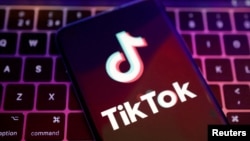On March 13, the United States House of Representatives overwhelmingly passed bipartisan legislation that gives ByteDance, the Chinese parent company of TikTok, six months to sell the TikTok app to a non-Chinese owner. A failure to comply would lead to TikTok’s ban from app stores and webhosting services in the U.S.
The U.S. lawmakers say ByteDance may be using the app to collect data on Americans and pass it on to the Chinese government. The app’s algorithms also are capable of influencing public opinion in the United States, where the platform has about 150 million users.
ByteDance, which spent about $21.3 million on federal lobbying trying to influence Washington decision-making, denies any connection with the Chinese government and will likely oppose the bill in court, claiming it violates the First Amendment of the U.S. Constitution (freedom of speech). The legislation’s “fate in the Senate is uncertain,” as it has both supporters and opponents who raise concern the ban could be seen as an act of censorship, The Wall Street Journal reported.
“This bill is not about censorship, it’s about the inverse of censorship, which is propaganda and foreign propaganda pitting Americans against Americans,” said the legislation’s co-author Mike Gallagher, a Republican representing the state of Wisconsin.
Beijing criticized the bill, accusing the U.S. of engaging in unfair competition, disrupting businesses and “sabotaging economic and trade order in the world.”
In a comment to CNN on March 13, Chinese Foreign Ministry spokesperson Wang Wenbin said:
“In recent years, though the U.S. has never found any evidence of TikTok posing a threat to the U.S.’ national security, it has never stopped going after TikTok.”
That is false.
There is abundant evidence directly refuting the denials by ByteDance and the Chinese government of TikTok’s ability to influence U.S. public opinion and prompt Americans to act.
For example, ByteDance recently tried stopping the U.S. bill by directing millions of American TikTok users to call their Congressional representatives’ offices and protest the potential ban. So many Americans did so that the calls overwhelmed the lawmakers’ communication lines, CyberNews reported.
“TikTok’s gross stunt proved our point,” said Ashley Hinson, a Republican representing the state of Iowa, during the March 13 debate. “What if on Election Day TikTok sent out an alert saying our elections were canceled?”
The evidence, which China’s foreign ministry claims the U.S. has “never found,” includes the following:
Mandiant Threat Intelligence reported in June 2019 that the People’s Republic of China created a network of hundreds of inauthentic multilanguage accounts across social media, including on TikTok, attempting to “physically mobilize protesters in the U.S.”
As part of this campaign, short videos on TikTok and other platforms discrediting Chinese dissidents and U.S. officials were created and promoted to the feeds of U.S. citizens. Many of the videos provided the targeted individuals' contact information and home addresses, Mandiant said.
In 2021, the PRC sponsored a campaign that targeted Asian Americans with thousands of posts urging them to protest the profiling of Asians in the U.S. on April 24 in New York City. The posts, illustrated with a large wrist smashing the “whites,” urged Asian Americans to “fight back.” Mandiant observed later reports saying that the protest was “successful,” with other minority groups joining the Asian Americans.
In 2022, after the U.S.’s diplomatic boycott of the Winter Olympics in Beijing, the PRC hired a U.S. PR firm to discretely recruit TikTok and other social media influencers in the U.S. to amplify China’s positive image, including by spreading disinformation and misinformation, the U.S. government cyber security agency CISA reported in its “Tactics of Disinformation” bulletin.
TikTok was launched in 2016. By that time, the Chinese government had already ramped up its cross-platform social media disinformation, researchers at Harvard University, Stanford University and the University of California, San Diego wrote in a joint study.
The PRC hired as many as 2 million people to spread its disinformation and misinformation, the study said. This group, also known as the “50 Cent Party,” annually produced about 448 million social media posts fabricated by the Chinese government, the study said.
ByteDance’s announcement in January that it is launching its own generative artificial intelligence model, called LEGO, added to the concerns over TikTok’s potential. The model embedded in the TikTok app “demonstrates precise identification and localization of specific regions in images or moments in videos,” CyberNews reported.
Yet the most damning data linking ByteDance with the PRC government comes from the March 2023 intelligence report by the Australian Senate's Select Committee on Foreign Interference through Social Media.
Headlined “TikTok, ByteDance, and their ties to the Chinese Communist Party,” the report details evidence tracing the origins of the parent company and its app to the Chinese government and the government’s ongoing control of both:
“Our research confirms beyond any plausible doubt that TikTok is owned by ByteDance, ByteDance is a PRC company, and ByteDance is subject to all the influence, guidance and de facto control to which the Chinese Communist Party now subjects all PRC technology companies.
“We show how the CCP and PRC state agencies have extended their ties into ByteDance to the point that the company can no longer be accurately described as a private enterprise.
“These findings draw on previously unexamined sources and contradict many of TikTok’s public statements. The most significant findings, in our view, relate to how TikTok’s capabilities may be integrated with what China’s leader Xi Jinping describes as the Party’s external discourse mechanisms.”
Fifteen countries and the European Union have partially or fully banned TikTok, labeling the app a threat to national security.
On February 19, the European Union opened an investigation into ByteDance and TikTok’s suspected breach of content rules, specifically in targeting minors with algorithmic systems that “may stimulate addictive behaviors and rabbit hole effects.”






